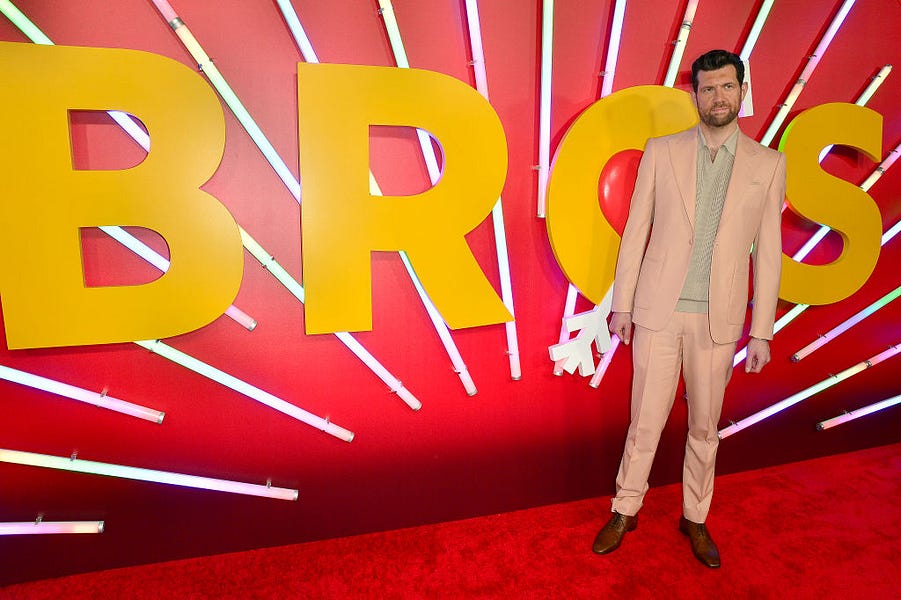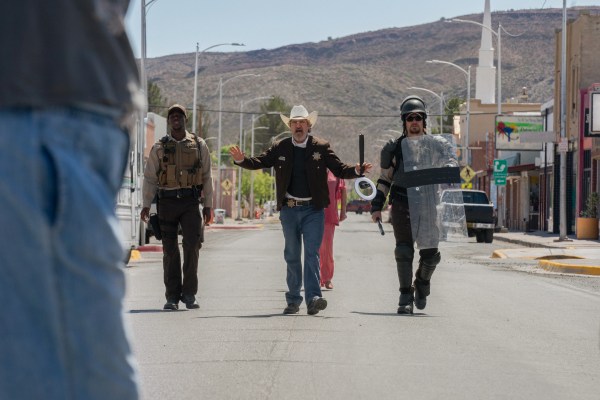Item, Hollywood Reporter, October 2: “‘Bros’ Box Office: Star Billy Eichner Decries Homophobia After Dismal Opening.”
Item, Slate, September 30 : “A New Movie About One of Our Most Controversial Pop Stars Shows We’ve Still Got a Lot of Reassessing to Do: A sexist ’90s culture wasn’t ready for an outspoken woman with a shaved head.”
Sundry items, the New York Times: “Is Softball Sexist?” “Are Algorithms Sexist?” “Is Your Pastor Sexist?” “Is Shielding Sarah Palin Sexist?” “ ‘House of the Dragon’ Is Less Sexist and Racist. But Is It Good?” “Is it any good?” is practically a revolutionary question—one that no one seems to have asked regarding that new Billy Eichner movie Bros, a romantic comedy about a gay couple. But the Times is an old hand at this: Feminists may chant, “My body, my choice!” but not when it comes to fashion. Nina Totenberg (best known for covering the Supreme Court at NPR) argued that accepting mini-skirts as a “fashion norm” would be “stupid and sexist” back around the time people kinda-sorta still gave a hoot who Sinead O’Connor is.
Call this the “soft Smollett.”
Jussie Smollett entered our national hall of infamy by pretending to be the victim of a violent crime motivated by racism and homophobia, one that was carried out by (so we were instructed to believe!) a couple of racist and gay-hating MAGA types who spent a lot of time watching gay black men on Empire—so much that they could spot Jussie Smollett on the street in Chicago, where they happened to be wandering around on the coldest night of the year with a bottle of bleach and a noose. The Smollett story was an interesting test case: Only a few months before the hoax hit the news, the nation had been transfixed by the Senate confirmation hearings of Brett Kavanaugh, who was accused of all manner of sexual violence, most prominently by Christine Blasey Ford. Blasey Ford, for whatever reason, received a tremendously sympathetic hearing, including from people who did not believe her claims about Kavanaugh but who conceded that something awful simply must have happened to her. People in public life were remarkably hesitant to suggest that the most obvious explanation was the true one—i.e., that she made the whole thing up, just as other similar claims about Kavanaugh, including those made in sworn statements, clearly had been invented. But people generally took a much more skeptical view of Smollett’s claims.
The “soft Smollett” is different from the full Smollett in that it cannily declines to provide specific villains whose guilt or innocence can be adjudicated in some rigorous way. Instead, it posits a general moral failing on the part of society at large—one that just happens to provide a useful excuse for an embarrassing failure, as in the case of Bros’ disappointing box-office numbers. Or it can provide useful ballast to wobbly progressive victimization narratives. Apocalypse cults always go wrong when they proffer a specific date for the end of the world—a competent conspiracy theory does not provide such easily falsified hypotheses. And, of course, a conspiracy theory—a polite-society conspiracy theory—is precisely what this sort of thing really is.
Billy Eichner is sure that homophobia is the culprit, which is one way to head off any consideration of the possibility that the movie isn’t any good, or that the pre-release marketing left people thinking that it probably wasn’t going to be any good. The notion that the American entertainment industry is profoundly shaped by homophobia in Anno Domini 2022 is, at the very least, non-obvious. Americans are happy to watch gay performers in gay roles in gay stories, gay performers in non-gay roles in non-gay stories, stories of all kinds written and directed by gay people, etc. Homophobia didn’t stop Jim Parsons from commanding $1 million per episode on The Big Bang Theory, people didn’t stop loving The Matrix or lamenting its terrible sequels when the Wachowski brothers became the Wachowski sisters, Kevin Williamson (Kevin Meade Williamson; people sometimes send me pitches meant for him) writes all the shows and makes all the money.
Here’s the Hollywood Reporter on the “Most Powerful LGBTQ Players in Hollywood”: “LGBTQ representation in Hollywood is at an all-time high. Thanks to the showrunners driving authentic stories, filmmakers bucking decades-old heteronormative paradigms, actors emboldened to live more honestly and platforms bankrolling so much of it, being gay, queer, transgender or any other other has never been more widely embraced in the entertainment industry.” Examples from the article: Roberto Aguirre-Sacasa “punctuates his youth-skewing slate (The CW’s Riverdale and Katy Keene and Netflix’s Chilling Adventures of Sabrina) with LGBTQ characters and storylines—including a transition arc on Sabrina, mirroring the life of genderqueer star Lachlan Watson.” Greg Berlanti: “Having fought to put the first same-sex kiss between two men on network TV (Dawson’s Creek), the megaproducer continues to represent the community in the many shows (he’s juggling 19) he has across six platforms. His directorial work on Love, Simon marked the first major studio movie to center on a gay teen romance.” HBO head of programming Casey Bloys: “Since taking the entertainment reins in 2016, Bloys has made it a mission to broaden inclusion efforts with YA hit Euphoria and period drama Gentleman Jack — both of which star queer characters. The out exec recently launched We’re Here, a rare unscripted foray in which drag queens visit small towns.” Lee Daniels: “On his Fox drama Empire, the creator infused broadcast TV with a rare portrayal of a queer African American man. On musical follow-up Star, Daniels cast the third openly transgender actor (Amiyah Scott) to play a major trans character in a U.S. TV drama.”
If you can’t make it in that world, maybe the problem isn’t homophobia. Maybe it’s your movie.
Because the third openly transgender actor isn’t news.
(Sure, go ahead and register that complaint about my white male privilege, as though “white male” really were a meaningful category. I know my people, and my people get two kinds of movies made about us, one typified by No Country for Old Men and the other by Friday Night Lights.)
Billy Eichner is a funny one, because he’s into politics in a semi-serious way. He has an official role in a progressive advocacy group and he is—inevitably, it seems—an Elizabeth Warren guy. Warren is, of course, one of the great political practitioners of the “soft Smollett,” insisting that she fared poorly in the 2020 primary because of sexism. I have not seen Bros, but I have watched Elizabeth Warren campaigning (Evacuation Day in Boston, open bar at 7 a.m., Warren trying to clap along and pretend that she knows the words to “Charlie on the MTA” in a room full of jaunty muldoons listing amid the Jameson’s fumes), and, as campaigners go, she stinks on ice. I’m surprised she manages to win even in Massachusetts—where, it is worth noting, she came in third in the Democratic presidential primary. Ask her to explain how sexism has held her back, and she complains that such questions are a “trap.” If that’s Billy Eichner’s idea of an inspiring politician, it’s no surprise that he blames homophobia for a bad movie opening, without any real evidence for the claim. That isn’t analysis–it is only habit.
At times, this stuff is positively hilarious. I spent some years working as a theater critic in New York, and it was really something to hear theater people insisting that what is holding back Broadway is homophobia.
What is remarkable is how these claims go unexamined and unchallenged. Slate writes of Sinead O’Connor that “a sexist ’90s culture wasn’t ready for an outspoken woman with a shaved head,” but of course it was more than ready for that: Sinead O’Connor was a huge star whose shaved head was practically iconic. Of course she was controversial—she worked tirelessly at being controversial. Her problem wasn’t that she irritated the Knights of Columbus; it was that she ran out of mawkish Prince songs to sing. (I prefer “The Emperor’s New Clothes,” but it never got above No. 60 on the charts.) She has had a fair bit of trouble since the apex of her career, and has made some pretty desperate pleas for attention—“I’m crazy!” “I’m a lesbian!” “I’m Muslim!”—but middle age and career decline are hard on some celebrities. Not everybody can be Paul McCartney. Maybe it’s not the culture.
Maybe algorithms aren’t sexist.
And maybe Americans have, after all these years, earned a little benefit of the doubt when it comes to these kinds of claims. Americans are bonkers, of course—look at our presidential elections or our homicide rates—but we’ll watch a good movie about gay people. We’ll even watch a mediocre movie about gay people, provided it is a lesbian period drama. There is plenty to criticize about American society, American culture, and, in particular, American popular culture, which is a sewer. But promiscuous and self-serving allegations of bigotry and victimization are as indefensible in the soft Smollett as in the full Smollett, and they deserve the same contempt.







Please note that we at The Dispatch hold ourselves, our work, and our commenters to a higher standard than other places on the internet. We welcome comments that foster genuine debate or discussion—including comments critical of us or our work—but responses that include ad hominem attacks on fellow Dispatch members or are intended to stoke fear and anger may be moderated.
With your membership, you only have the ability to comment on The Morning Dispatch articles. Consider upgrading to join the conversation everywhere.